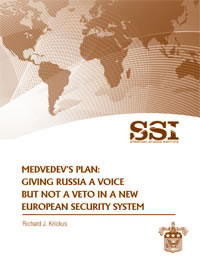Medvedev's Plan: Giving Russia a Voice but not a Veto in a New European Security System

Authored by Dr. Richard J. Krickus.
December 2009
121 Pages
Brief Synopsis
The author addresses the question of how to give Russia a voice but not a veto in a new European security system and provides some provocative recommendations. Most specifically, he proposes that the time has come to provide Russia with a NATO Membership Action Plan (MAP) and agrees that those who argue against it remain mired in a Cold War mindset that is out of sync with today’s strategic realities. Ultimately, a campaign to include Russia in NATO may fail but at the very least, the endeavor deserves serious consideration. He also provides compelling reasons why U.S. defense analysts must consider several future outcomes for Russia. In addition to being the only state that is capable of devastating the United States in a nuclear exchange, most of the world’s population and resources exist on the borders of its massive territory. Its future then, will shape the global strategic environment for decades to come.
Summary
How do we give Russia a voice but not a veto in crafting a new European security system? This question has preoccupied analysts in Brussels, Moscow, and Washington ever since Russian President Dmitry Medvedev proclaimed that the existing one was deeply flawed. Vladimir Putin’s protégé observed last summer that the American “unipolar moment” upon which it rested was over. The United States could no longer dominate the international agenda nor could NATO do the same thing in Europe.
The purpose of this monograph is to provide insight into the problems and prospects of the United States and Europe creating a new security relationship with Russia—one that can enhance the national security of all three of them. It will be comprised of three parts. First, it will address several compelling questions: What is the Russian case for a new security system? What are the arguments in opposition to it? And why, in spite of profound reservations about cooperation with Moscow, are Western statesmen prepared to consider it? In this connection, the factors that prevented a nuclear war between the Soviet Union and the West will provide a framework for our analysis: in sum, the triangular relationship between deterrence, arms control, and conflict management.
Second, points of conflict between the Western alliance on the one hand and Russia on the other will be assessed: for example, friction associated with NATO, its eastward enlargement in particular; a U.S. missile defense system in Eastern Europe; the future of the Conventional Forces in Europe Treaty (CFE) and the Organization of Security Cooperation in Europe (OSCE); and of most urgent significance the need to reconfigure the strategic nuclear balance between Washington and Moscow by providing a new START.
Third, conclusions and recommendations will be provided that have a bearing on how the United States should respond to Medvedev’s proposal and other issues associated with efforts to integrate Russia into the Western security system. A number of issues that will determine whether this campaign succeeds or fails will be assessed. For example, much has been said about a value gap that separates the West and Russia but little about differences within the Trans-Atlantic alliance and the European Union that will have a profound impact upon the prospects for security cooperation among the three partners. This assessment will provide insight into the compelling question: How to provide Russia with a voice but not a veto in crafting a new Trans-Atlantic security system? In this connection, the answer will involve a step-by-step process that rests upon renegotiating the START which expires at the end of this year. It also will investigate an initiative that borders on the unthinkable for most American defense analysts: providing Russia with a MAP for NATO membership.
This recommendation represents a minority view, but there is mounting support for it as it is apparent that the time has come to think beyond the Cold War worldview that has restrained bold new thinking about the West’s relationship with Russia. The wars in the Greater Middle East, of course, now preoccupy American strategists, but they cannot lose sight of the following observations: Russia is the only country capable of devastating the United States in a nuclear attack; major American security priorities cannot be achieved without its cooperation; and most of the world’s people and resources exist in and around its territory. Changes that occur within it will have profound consequences for American global military planning, and they deserve our close attention.
Access Full Report [PDF]: Medvedev's Plan: Giving Russia a Voice but not a Veto in a New European Security System
|
NEWSLETTER
|
| Join the GlobalSecurity.org mailing list |
|
|
|

